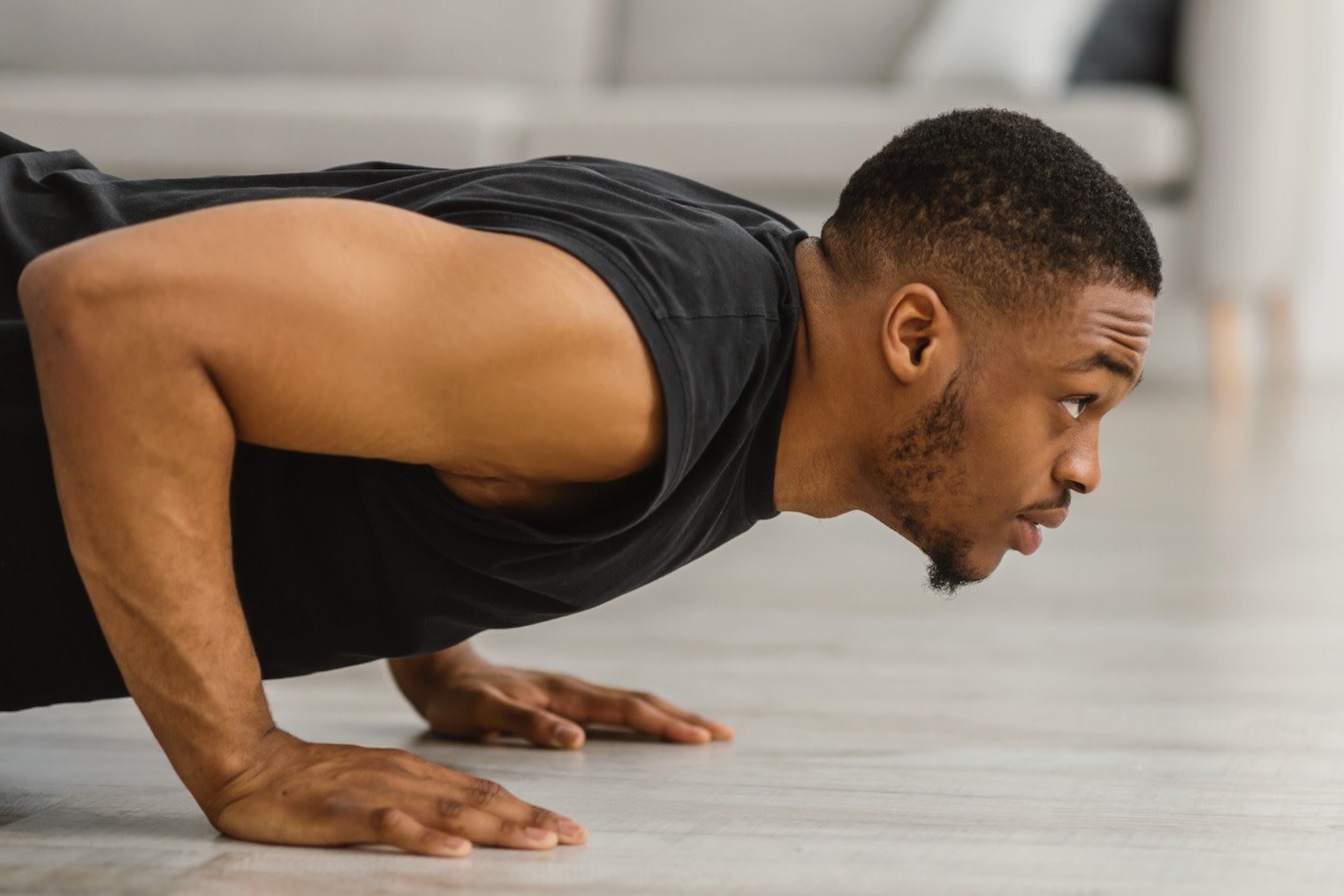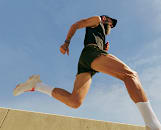
Prostock-Studio / iStock / Getty Images Plus via Getty Images
Why Your Shoulders Pop and Crack During Push-Ups—and What to Do
That crunchy shoulder soundtrack you hear during push-ups is usually harmless, experts say. Here’s what to know.
By Kathleen Ferraro•
Why Your Shoulders May Crack and Pop When Doing Push-Ups
How to Prevent Shoulder Popping When Doing Push-Ups
What to Do When Your Shoulder Pops or Cracks During a Push-Up
When to Talk with Your Healthcare Provider About Popping Shoulders
The Takeaway
You’re halfway through a set of push-ups when—pop—your shoulder makes a weird cracking sound. You pause, listen, maybe try the movement another time. There it is again. Should you be concerned?
Discover more ways to reach your goals with Peloton
If your shoulder pops or cracks when doing push-ups, rest assured that it’s usually nothing to worry about. Much like popping knuckles or cracking knees when you squat, these sounds are often a normal part of how joints move. But if it keeps happening or starts to feel uncomfortable, it’s natural to wonder what’s going on and whether or not you should continue.
To help you decode what your shoulder might be trying to tell you, we talked to experts about the most common causes of shoulder popping during push-ups, how to prevent it, and when it might be time to check in with a healthcare provider.
Why Your Shoulders May Crack and Pop When Doing Push-Ups
The good news: If your shoulder pops or cracks during push-ups and doesn’t hurt, there’s likely nothing to worry about.
“The first thing to know is that non-painful popping, cracking, or clicking is not a problem and does not mean there is a joint issue with the vast majority of cases, though it can be annoying,” says Zach Smith, a physical therapist and owner of HIDEF Physical Therapy.
So what’s actually behind that odd shoulder soundtrack? Most times, it’s harmless—here’s the breakdown.
1. Cavitation
According to Smith, the most common cause of those sounds is cavitation, a fancy term for the same phenomenon behind cracking your knuckles or back.
“This is thought to happen when a low-pressure area in a joint develops and causes gases to compress and create tiny bubbles,” Smith says. The theory is that when you move your joint a certain way, those bubbles collapse, causing a popping sound.
2. Snapping Tendons
Another potential cause behind a cracking sound in the shoulder when doing push-ups? Tendons “snapping.” But don’t worry, this doesn’t mean they’re breaking. It’s more like snapping your fingers, Smith explains.
“Several muscles and tendons surround our shoulder. These tendons glide over the bones during a push-up,” says Kshitija Phansalkar, a physical therapist and clinical director of FYZICAL Therapy & Balance Centers. “While gliding, the tendons may ‘snap’ over a bony area, producing the clicking. Think of these tendon movements as strumming a guitar over your bones.”
3. Shoulder Instability or Weakness
Those popping and cracking sounds could also be the byproduct of shoulder instability, inflexibility, or weakness, Phansalkar says.
“An unstable shoulder can cause popping or clicking as the ball of the upper arm shifts during movements like push-ups,” she says. “This instability can result from previous dislocations, ligament laxity, or muscle imbalances.”
Likewise, weakness or stiffness in the muscles that support and stabilize the shoulder (like the serratus anterior and lower trapezius) can lead to abnormal shoulder mechanics and, in turn, those odd noises, according to Phansalkar.
4. Poor Form
“Incorrect form and technique during push-ups can place unwanted stress on the shoulder joint and surrounding structures, potentially leading to cracking or popping,” Phansalkar says.
Michael W. Eng, MD, an orthopedic surgeon at Hoag Orthopedic Institute, recommends tucking your elbows inward to prevent them from flaring outward. He also emphasizes the importance of engaging your core and squeezing your shoulder blades slightly for support throughout the movement.
5. Underlying Shoulder Conditions
If the popping is persistent and starts to feel uncomfortable, that could be a sign you’re dealing with an underlying joint injury or condition, Dr. Eng says.
One possible reason could be inflammation in the fluid-filled sacs (bursa) that reduce friction between your shoulder blade and rib cage, according to Phansalkar. “Inflammation of this bursa can cause a painful snapping, popping, or grinding sensation during shoulder movement, also known as snapping scapula syndrome,” she says.
Phansalkar adds that in some rare cases, those cracking sounds may be caused by underlying medical conditions, including:
Labral tears (damage to cartilage surrounding the shoulder joint)
Shoulder osteoarthritis
Bone growths (osteochondromas)
Bone fracture or dislocation
Improperly healed past injuries
However, unless you also have pain, swelling, limited mobility, or deformity, it’s unlikely that shoulder popping is due to one of these issues.
How to Prevent Shoulder Popping When Doing Push-Ups
Though shoulder popping is typically harmless, there are still ways to reduce or prevent it.
One effective way to avoid noisy shoulders? Maintain proper form during push-ups (or any exercise, for that matter). “Elbows should be close to the body as you lower and push,” Phansalkar says. “They should not flare out: This causes internal rotation or inward turning of your arm, which increases the strain on the structures of your shoulder.”
She also recommends keeping your hands shoulder-width apart or slightly wider, with your weight evenly distributed through your palms. And as Dr. Eng mentioned earlier, remember to engage your core and slightly squeeze your shoulder blades together for additional support as you move through the push-up.

Warming up is also key for preventing shoulder popping when doing push-ups. “A good warm-up is the primary ingredient for avoiding exercise injuries,” Phansalkar says. “Warming up increases blood flow, elasticity, and muscle activity and helps reduce friction. This prepares the joint and soft tissue for the exercises.” Gentle movements like arm circles, shoulder rolls, or a few dynamic stretches can help prime your shoulders before diving into more joint-intensive moves like push-ups.
Regular strength and mobility work can also make a big difference in the longer term. “Creating more stability in your shoulders and working on range of motion and regular stretching can help to reduce this,” Smith says. “If the muscles are stabilizing the joint better and the muscles have adequate length, you may be able to reduce the popping sounds in the shoulder.”
What to Do When Your Shoulder Pops or Cracks During a Push-Up
So you’re doing push-ups, and pop—there’s that cracking sound again. Should you stop?
Short answer: Probably not, unless it hurts.
“For non-painful popping, simply adjust the angle of where your shoulder is by bringing your elbows closer or further away from your body and try again,” Smith recommends. As long as there’s still no pain after adjusting, you’re good to keep working out even if there is still some popping, Dr. Eng adds.
If the pops feel uncomfortable (but not outright painful), consider skipping push-ups for the day, Phansalkar says. You can also try a push-up variation to reduce joint strain and cracking. “Change the depth of the push-up or make it easier by going to a bench or doing it from your knees,” Smith says.
But if the popping is paired with shoulder pain during push-ups, it’s time to stop immediately. “Do not push through pain,” Phansalkar says. “Identify which movements cause pain and avoid these motions. Consider applying ice for 20 minutes to address any potential inflammation. If pain persists or worsens, consult a health care professional.”
When to Talk with Your Healthcare Provider About Popping Shoulders
Sometimes, painful shoulder popping can mean something more serious. According to Duke Health, Phansalkar, and Smith, you should stop doing push-ups and see a physical therapist or orthopedic doctor if you notice any of these red flags along with the popping or cracking noise:
Limited range of motion
Sudden weakness
Numbness
Feeling like the shoulder joint is loose
Deformity
Swelling or bruising
Shoulder pain, including pain that gets worse or persists over time
The Takeaway
If your shoulder pops or cracks during push-ups, it’s usually nothing to worry about if it’s not painful. Most of the time, it’s caused by harmless issues like cavitation (gas bubbles in your joints), poor form, tendons gliding over bones, or muscle tightness and weakness. In rarer cases, it could point to underlying conditions like bursitis.
The fix: Warm up properly, focus on good form, and support your push-ups with regular shoulder strength and stability work. If the popping is pain-free, try adjusting your form and feel free to keep going. If it feels uncomfortable, take a break or switch to a gentler push-up variation. But if the popping comes with pain, swelling, or limited movement, stop exercising and check in with a healthcare provider.
Related Articles
This content is for informational and educational purposes only and does not constitute individualized advice. It is not intended to replace professional medical evaluation, diagnosis, or treatment. Seek the advice of your physician for questions you may have regarding your health or a medical condition. If you are having a medical emergency, call your physician or 911 immediately.
Get our latest health stories straight to your inbox
Enter your email to get articles, expert-backed tips, and updates from Peloton sent to your inbox.
By providing your email address, you agree to receive marketing communications from Peloton.
For more about how we use your information, see our Privacy Policy.









